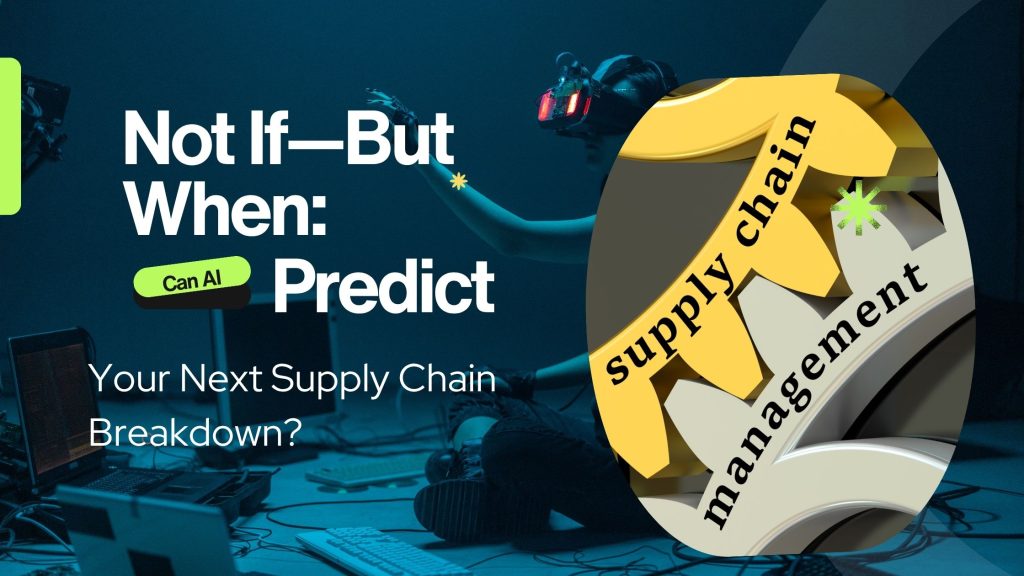Imagine a world where supply chain disruptions are predicted before they occur. A landscape where companies aren’t just reacting to problems but staying one step ahead of potential breakdowns. This is the promise of AI in supply chain management. As businesses face increasing complexity and demands, the question arises: Can AI predict your next supply chain crisis?
With advanced algorithms and real-time data analysis, AI has emerged as a game-changer for organizations looking to optimize their operations. From forecasting demand surges to identifying weak links in the logistics network, AI’s role is becoming indispensable. Let’s explore how this technology can transform your approach to managing supply chains and prevent costly interruptions down the line.
The Growing Importance of AI in Predicting Supply Chain Breakdowns
The supply chain landscape is evolving rapidly. Businesses face increasing complexity, making it essential to anticipate disruptions.
AI stands at the forefront of this transformation. Its ability to sift through vast data sets allows for real-time insights that were once unimaginable. Companies can now predict potential breakdowns before they occur.
Moreover, AI learns from historical patterns and adapts accordingly. This predictive capability enhances decision-making processes across various sectors. When companies harness AI effectively, they gain a significant competitive edge.
As global markets fluctuate unpredictably, reliance on traditional methods becomes risky. Embracing AI not only mitigates risk but also fosters resilience within supply chains.
With each passing day, the demand for smarter solutions grows stronger. Organizations that leverage AI in their strategies are better positioned to navigate uncertainties ahead.
Examples of Companies Successfully Using AI for Supply Chain Management
Numerous companies are harnessing AI to redefine their supply chain operations. For instance, Amazon employs machine learning algorithms to optimize inventory levels and predict customer demand. Their system analyzes vast data sets in real-time, enabling swift adjustments that enhance efficiency.
Walmart is another notable player. The retail giant uses AI for predictive analytics to foresee stock shortages and manage logistics more effectively. This approach minimizes waste while ensuring shelves remain stocked with popular items.
Then there’s Unilever, which leverages AI-driven tools for improving supplier management and forecasting market trends. By analyzing consumer behavior patterns, they can make informed decisions that drive profitability.
These examples highlight how innovative organizations integrate advanced technologies into their supply chains, transforming challenges into opportunities through actionable insights gained from AI analysis.
Potential Challenges and Limitations of Using AI in Supply Chain Management
Implementing AI in supply chain management isn’t without its hurdles. One major challenge is data quality. AI systems thrive on accurate, comprehensive data to make reliable predictions. Inconsistent or outdated information can lead to flawed insights.
Another limitation lies in the complexity of integration. Many companies use legacy systems that are not easily compatible with advanced AI technologies. This disconnection can hinder seamless operations and slow down decision-making processes.
Moreover, there’s a human element to consider. Staff may resist adopting new technologies due to fear of job displacement or lack of understanding about how these tools work. Training employees effectively is essential for successful implementation.
Ethical concerns arise around transparency and bias in algorithms. Companies must ensure their AI solutions operate fairly and do not inadvertently reinforce existing biases within their supply chains.
How to Integrate AI into Your Supply Chain Strategy
Integrating AI into your supply chain strategy requires a thoughtful approach. Start by assessing your current processes. Identify areas where AI can add value, such as inventory management or demand forecasting.
Next, invest in the right technology. Choose platforms that offer machine learning capabilities tailored to your specific needs. Look for user-friendly interfaces that allow your team to adapt quickly.
Data is key in this transition. Ensure you have high-quality data from reliable sources to feed the AI algorithms. This step is crucial for accurate predictions and insights.
Training personnel is equally important. Equip your staff with knowledge about how AI works and its benefits for their roles within the supply chain.
Foster a culture of innovation within your organization. Encourage collaboration between departments to maximize the advantages of integrating AI throughout all facets of your supply chain operations.
Case Studies of AI Predicting and Preventing Supply Chain Breakdowns
One notable case study involves a leading automotive manufacturer that faced significant disruption due to unpredictable parts shortages. By integrating AI-powered analytics, they could forecast potential supply chain interruptions weeks in advance. The system analyzed historical data and real-time market trends, enabling the company to adjust orders proactively.
Another example comes from a major retailer known for its expansive inventory management challenges. Using machine learning algorithms, they successfully predicted demand surges during peak shopping seasons. This foresight allowed them to optimize stock levels ahead of time, minimizing out-of-stock situations and maximizing sales.
A logistics firm also leveraged AI to enhance route optimization for delivery trucks. With predictive capabilities assessing traffic patterns and weather conditions, they managed to cut delays dramatically while improving customer satisfaction with timely deliveries. Such examples illustrate how AI not only predicts but actively prevents supply chain breakdowns across various industries.
Benefits of Utilizing AI in Supply Chain Management
Harnessing AI in supply chain management brings a multitude of advantages that companies can no longer afford to overlook. One of the most significant benefits is enhanced efficiency. With algorithms analyzing vast data sets, organizations can optimize routes and inventory levels, reducing costs drastically.
Another key benefit is improved forecasting accuracy. AI systems learn from historical trends, enabling businesses to predict demand fluctuations with remarkable precision. This capability helps avoid both overstock and stockouts.
Moreover, AI enhances risk management by identifying potential disruptions early on. Proactive adjustments allow companies to maintain operational continuity even in turbulent times.
The integration of AI fosters better decision-making through real-time insights. Leaders gain access to actionable data that drives strategic initiatives and boosts overall productivity across the supply chain network.
Conclusion: Embracing The Future of Supply
As businesses navigate the complexities of modern supply chains, the integration of AI becomes more critical. The ability to predict potential disruptions before they escalate into significant breakdowns can save companies time and money. By leveraging advanced algorithms and real-time data analysis, organizations can enhance their decision-making processes.
The future of supply chain management lies in embracing innovative technologies like AI. These tools not only streamline operations but also provide insights that were previously unattainable. Companies willing to invest in these advancements position themselves ahead of competitors while safeguarding their resources.
Looking forward, organizations must prioritize strategies that incorporate AI effectively within their frameworks. This proactive approach will lead to improved efficiency and reduced risks associated with unforeseen events.
Embracing this technological shift is about more than just keeping pace; it’s about transforming how we understand and manage our supply chains for a resilient tomorrow.

